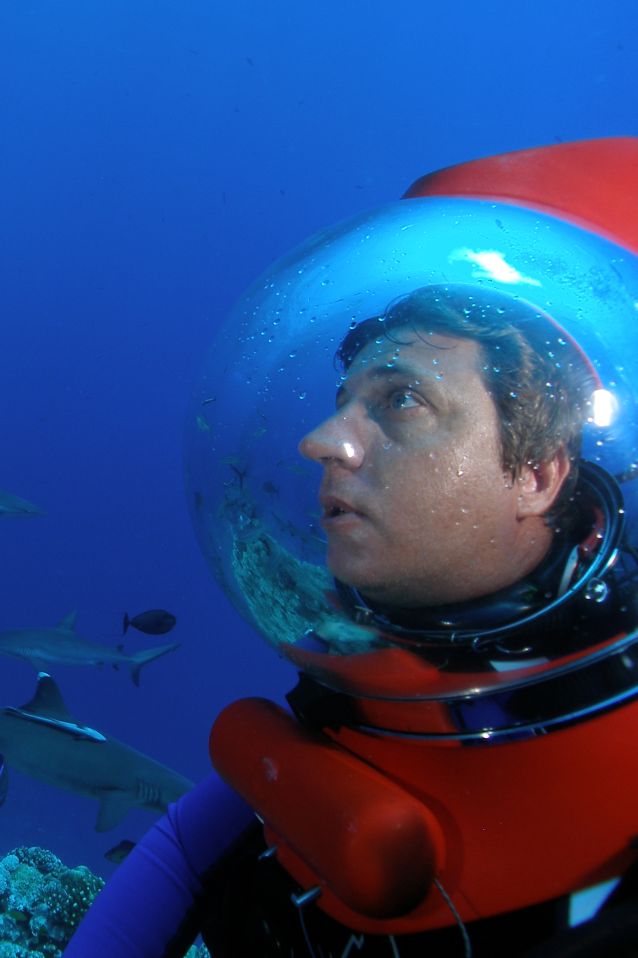Richard Fitzpatrick Book as a speaker/entertainer for your next event
Key Points for Richard Fitzpatrick
- Richard Fitzpatrick is an Emmy Award Winner.
- Has filmed more than 50 documentaries for BBC, National Geographic and Discovery.
- Spent more than 15,000 hours underwater.
- Has been bitten and stung by sharks, sea snakes, box jellyfish and lots of other critters.
- Shark researcher known for radical technique of catching sharks by the tail
- Author of Shark Tracker.
Topics for Richard Fitzpatrick
- Lights, Camera, Sharks. Life behind the lens of a wildlife cameraman
What’s it like filming for David Attenborough? Marine biologist and award-winning cinematographer Richard Fitzpatrick says it’s 90% getting there and waiting for something to happen, 9% filming and 1% sheer terror. Many say Richard has the best job in the world. And as someone who gets to film sharks, venomous marine animals and their behaviours - often never seen before - on a daily basis, the job is pretty great. Like all jobs, there are high and low points. It’s just that Richard’s low points normally occur 30m underwater and involve shark and snake bites, jellyfish and stonefish stings, and a number of other injuries that have made Richard well-known at hospitals along the north-east coast of Australia. There’s no doubt those days have a lasting effect, both physically and in the stories that become legends, with plenty of photos and videos in the case of amnesia. Watch and listen as Richard shares the highlights and lowlights of his life behind the lens. - A shark reality - A life with sharks
When Richard Fitzpatrick was 12, he adopted his first pet from the ocean, a small epaulette shark. Ten years later, as a marine biologist working in the field, he upgraded to a Great White, Bruce. Richard’s fascination with sharks has taken him all around the world, researching and filming their behaviour for the BBC and Discovery Channel’s Shark Week. Along the way, he has gained a reputation for his unorthodox method of catching sharks literally by the tail rather than using a hook. It may be a less stressful technique for the sharks, but for Richard it’s meant firsthand accounts of shark bites, severe concussions and a few broken bones. Chasing sharks hasn’t been all hospital visits though, with Richard working with the national police and military and as a Hollywood stuntman. Hear about what it’s like to live with Jaws as your best friend, the shark attacks and close encounters, and who would win in a battle between the tiger and Great White. - The Great Barrier Reef
The Great Barrier Reef is the largest living structure on earth, so enormous that it can be seen from space. Award-winning cinematographer and marine biologist Richard Fitzpatrick has been lucky enough to spend all of his adult life working along the entire 2500 kilometres of the Great Barrier Reef. One of the most diverse places on the planet, Richard has filmed all kinds of species on the Reef, from microscopic coral polyps to the enormous minke and humpback whales that migrate from Antarctica each year. The jewel in the crown is Raine Island in the Far North where David Attenborough filmed his first ever film in 1957 and where every night during summer over 10,000 turtles emerge to lay eggs on the island. Also one of the largest sea bird nesting site in Australia, Raine Island is a great example of how species interact on the Reef. Richard talks about Raine Island, working with David Attenborough on his BBC Great Barrier Reef series and why the Reef is critical to our existence. - Sex on the reef: what goes on beneath the waves
Sex was invented in the oceans when life first evolved on Planet Earth, giving a whole new meaning to the Big Bang. Beneath the waves, we can still see any and every sexual adventure ever conceived. From the world’s largest mass orgy that occurs each year on the Great Barrier Reef to sex changing clownfish (sorry Disney, you got that totally wrong in Finding Nemo). In his long career filming the underwater sexual exploits of marine animals for the BBC, National Geographic and Discovery Channel, marine biologist and award-winning cinematographer Richard Fitzpatrick has many funny stories and videos to share. If you ever wanted to know how spiny sea urchins fornicate or see sexual justice being served underwater as the male seahorse gets pregnant and gives birth to over 300 babies – this is for you.
Testimonials for Richard Fitzpatrick
Richard had our audience in the palm of his hand. Entertaining, enthralling and inspirational – Richard was able to provide an insight into his work which had everyone hook, line and sinker!
Great Barrier Reef Foundation


